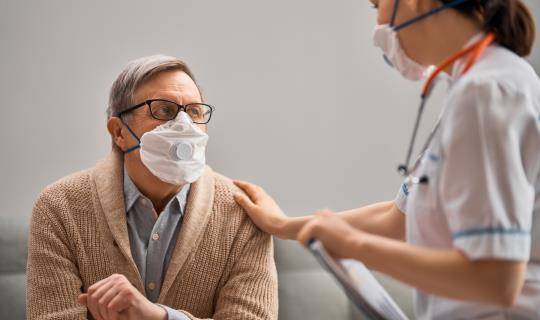How Community and Specialty Physician Practices Are Confronting COVID-19 Challenges
By AmerisourceBergen

Physician practices across America are facing unprecedented challenges from the coronavirus pandemic. “I don't think there's an independent practice in the country, across all specialties, that has not been affected in some way by this COVID-19 crisis," said Barry V. Fortner, Ph.D., President of Specialty Physician Services at AmerisourceBergen, in a recent virtual roundtable.
Between government stay-at-home orders and generalized anxiety over being in public spaces, patient volumes at private practices have decreased across the board. An April poll of 2,000 Americans showed sixty-four percent would be unlikely to visit a specialist for non-coronavirus-related care.
But despite financial challenges and concerns over the health and safety of their own staff, many physician's offices are offering remarkable examples of innovation, resilience and compassion during a crisis.
Communicate, Communicate, Communicate
Vistar Eye Care in southwestern Virginia began to see no-shows once stay-at-home orders came through in their state. As an adjustment, the practice stopped using the automated reminder system. Staff call patients two days before appointments. “That has made a huge difference. Our patients are able to ask questions. They know what they are doing to keep them safe," said Bridget Proutey, Office Manager.
The private practice pivoted to focusing on monthly injections and emergent cases, such as retinal tears and detachments. When possible, they rescheduled follow-up appointments to make sure there aren't too many patients in the waiting room. As a result, there are now fewer no-shows.
Shanahan Rheumatology in Durham, NC, also communicates with patients before scheduled appointments. “For every person that was prepared to cancel, once they heard what we are doing, I'd say, seventy-five percent of them changed their mind," said Lisa Shanahan, Owner/Practice Manager. “We're making them feel safe." As a result, the practice has gotten more positive feedback on how happy patients are in the last four weeks than at any other time. In May, they had almost their full clinic schedule.
"It's tricky trying to encourage anyone under acute stress," Fortner said as he addressed AmerisourceBergen's over 40,000 physician practice customers. "The time is now to make communities aware of your ability to provide safe, effective and convenient treatment."
Safe Caregiving Protocols
Northwest Oncology & Hematology in Illinois began seeing a reduction in visits in March. They are not alone among oncology practices. A review of EMR data through April 21, 2020 found an 86 to 94 percent drop in weekly screenings for breast, cervical and colon cancers in 2020 when compared to the weekly averages for 2017-2019. The EMR data does not say why the drop occurred; however, it is reasonable to assume it is related to COVID-19 stay-at-home mandates.
But we've also seen practices find innovative ways to continue delivering quality care while social distancing. St. Louis Cancer Care, LLC has prohibited visitors in the office and set social distancing parameters for patients and staff in waiting and treatment rooms, according to Carol Riley, Practice Manager. The practice has also started administering drive-up injections so patients don't have to leave their cars.
“Telehealth visits have become part of our everyday lives," said Kim Hunt, Practice Manager, Northwest Oncology & Hematology. Twenty-three percent of Americans have engaged with telehealth since the start of the pandemic. Northwest Oncology & Hematology saw its decrease level off once their telehealth program was operational. They still see the biggest loss in routine, follow-up appointments.
Protecting Physical Health of Workers
Community practices are also focusing on keeping their staff healthy, physically and mentally. “Initially, it was a struggle to obtain the PPE we needed so that our staff felt safe coming into work every day," said Lisa Raff, Oncology Clinical Pharmacy Manager at Northwest Oncology & Hematology in Illinois. To stay prepared for future crises, the practice is working with their purchasing manager to make sure they have enough PPE on hand if there's a spike in COVID-19 cases. “I really hope our fellow practices also keep supplies on hand for six months."
In the present, Northwest Oncology & Hematology has implemented new staff safety policies. They try to minimize the transfer of staff between its five locations. All staff must enter through the same door, take and log their temperature and answer questions about any symptoms of coronavirus before entering. Raff admitted there will likely be screening in place for a long time, even after Illinois lifts social distancing requirements.
Staff must also wash hands or use sanitizer before coming into the building, and there are stricter policies requesting employees to stay home when they don't feel well. “We couldn't take a chance on someone coming in and spreading something to our immunocompromised patients," said Raff.
Vistar Eye Center in southwestern Virginia made it mandatory for anyone entering their offices to wear a mask. For staff and patient safety, they are taking longer to thoroughly clean exam rooms.
Staff Enthusiasm Through Tough Times
Hunt said, “We helped to manage concerns with a lot of communication with our staff. Physician leaders thank staff for their dedication in weekly emails." Communications also share the latest stats and local guidelines around social distancing and wearing masks.
“Staff enthusiasm has been key," said Shanahan. “We've done more team-building in the past six weeks." Once a week she buys dinner from local restaurants for staff to take home to their families, supporting both staff and the area's small businesses.
Productivity remains high among these specialty physician offices' employees. Call-outs have actually decreased among staff at Northwest Oncology & Hematology. Patients appreciate the dedication. They've sent in meals for the staff to thank them for still providing treatments.
The majority of Northwest Oncology & Hematology's business office employees began working at home since the pandemic and have commented on how much they like it. Crucially, there has been no slowdown in their work. “If it leads to increased employee satisfaction, when the time comes, it may be something that's continued," said Raff.
For his part, Fortner reminded specialty physicians, “Folks who have predicted your demise have been wrong time and time again because of your flexibility, your adaptability, your efficiency and the fundamental value you deliver." These practices are showing that same resiliency during the coronavirus pandemic.
"This is a roller-coaster ride. Things change daily, so we just need to be prepared," said Proutey.
We are Community
We celebrate community physician practices as they provide safe, quality, care.




